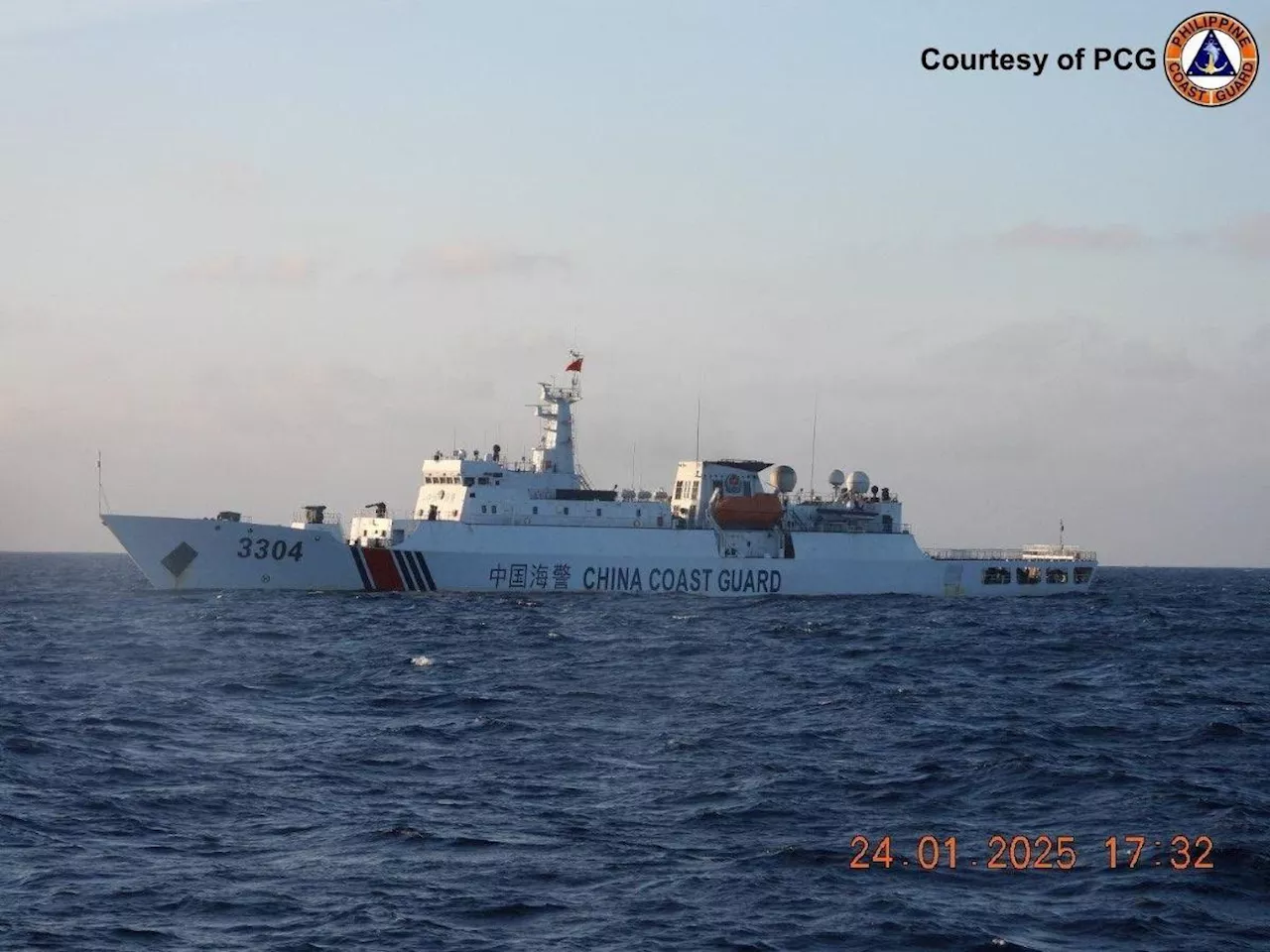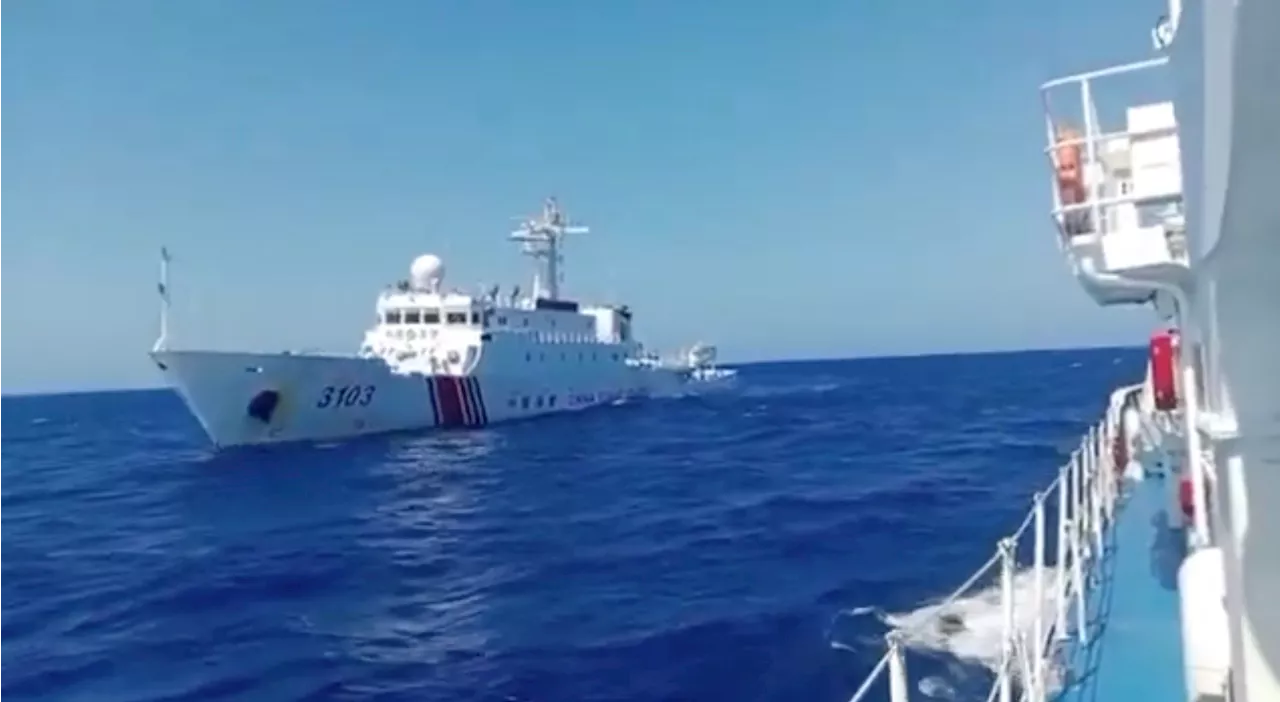Philippine President Ferdinand Marcos Jr. issued a challenge to China, urging them to cease their aggressive and coercive actions in the West Philippine Sea, including territorial claims, harassment of fishermen, and use of force against Philippine vessels. Marcos stated he would return a Typhon missile system to the United States if China stopped these activities.
MANILA, Philippines — President Ferdinand Marcos Jr. on Thursday challenged China to stop its 'aggressive and coercive behavior' and its claiming of territory in the West Philippine Sea and said he would return a Typhon missile system to the United States.Marcos issued the statement after China urged the Philippine government to pull out the missile launchers after they were reportedly moved to another area in Luzon.
We don't make any comments on their missile systems, and their missile systems are a thousand times more powerful than what we have,' Marcos said during a media interview in Lapu-Lapu City.'Let's make a deal with China: Stop claiming our territory, stop harassing our fishermen and let them have a living, stop ramming our boats, stop water cannoning our people, stop firing lasers at us, and stop your aggressive and coercive behavior, and I'll return the typhon missiles.
CHINA PHILIPPINES WEST PHILIPPINE SEA TERRITORIAL DISPUTES MISSILE SYSTEM
Philippines Latest News, Philippines Headlines
Similar News:You can also read news stories similar to this one that we have collected from other news sources.
 Philippine Singer Launches Movement to Unite Filipinos Against China in West Philippine Sea DisputeRannie Raymundo, a popular Filipino singer, has joined forces with the Fraternal Order of Philippine Eagles to spearhead a nationwide movement aimed at rallying Filipinos in response to escalating tensions in the West Philippine Sea. The WPS Eagles Movement seeks to foster patriotism, galvanize collective action, and counteract Chinese disinformation campaigns.
Philippine Singer Launches Movement to Unite Filipinos Against China in West Philippine Sea DisputeRannie Raymundo, a popular Filipino singer, has joined forces with the Fraternal Order of Philippine Eagles to spearhead a nationwide movement aimed at rallying Filipinos in response to escalating tensions in the West Philippine Sea. The WPS Eagles Movement seeks to foster patriotism, galvanize collective action, and counteract Chinese disinformation campaigns.
Read more »
 China Coast Guard and PLAN Harass Philippine Vessels in West Philippine SeaThe Philippine Coast Guard reports that Chinese maritime forces harassed Bureau of Fisheries and Aquatic Resources vessels conducting scientific research and sand sampling in the West Philippine Sea.
China Coast Guard and PLAN Harass Philippine Vessels in West Philippine SeaThe Philippine Coast Guard reports that Chinese maritime forces harassed Bureau of Fisheries and Aquatic Resources vessels conducting scientific research and sand sampling in the West Philippine Sea.
Read more »
 Philippine Navy: China's Use of LRAD Signals Escalating Aggression in West Philippine SeaThe Philippine Navy has condemned the use of Long-Range Acoustic Devices (LRAD) by the China Coast Guard (CCG) against a Philippine Coast Guard vessel, calling it a clear escalation of aggression in the West Philippine Sea. Rear Admiral Roy Vincent Trinidad, spokesperson for the Philippine Navy in the WPS, stated that the LRAD signifies an increase in the Chinese Communist Party's aggression and underscores their illegal presence and coercive actions in the disputed waters. He linked this incident with China's broader strategy of asserting territorial claims over the South China Sea, citing the recent arrest of a Chinese national involved in intelligence surveillance of Philippine infrastructure.
Philippine Navy: China's Use of LRAD Signals Escalating Aggression in West Philippine SeaThe Philippine Navy has condemned the use of Long-Range Acoustic Devices (LRAD) by the China Coast Guard (CCG) against a Philippine Coast Guard vessel, calling it a clear escalation of aggression in the West Philippine Sea. Rear Admiral Roy Vincent Trinidad, spokesperson for the Philippine Navy in the WPS, stated that the LRAD signifies an increase in the Chinese Communist Party's aggression and underscores their illegal presence and coercive actions in the disputed waters. He linked this incident with China's broader strategy of asserting territorial claims over the South China Sea, citing the recent arrest of a Chinese national involved in intelligence surveillance of Philippine infrastructure.
Read more »
 Philippine Coast Guard Stands Firm Against Chinese Vessels in West Philippine SeaThe Philippine Coast Guard (PCG) asserts its authority in the West Philippine Sea (WPS), issuing radio challenges to Chinese Coast Guard (CCG) vessels encroaching within the country's exclusive economic zone (EEZ).
Philippine Coast Guard Stands Firm Against Chinese Vessels in West Philippine SeaThe Philippine Coast Guard (PCG) asserts its authority in the West Philippine Sea (WPS), issuing radio challenges to Chinese Coast Guard (CCG) vessels encroaching within the country's exclusive economic zone (EEZ).
Read more »
 Philippine Coast Guard Stands Firm Against Chinese Vessels in West Philippine SeaA Philippine Coast Guard (PCG) ship, BRP Cabra, successfully deterred three Chinese vessels from approaching the coast of Zambales. The incident highlights the ongoing tensions in the disputed West Philippine Sea. Meanwhile, the PCG launched a comic book to counter alleged Chinese disinformation and promote awareness about the country's maritime rights.
Philippine Coast Guard Stands Firm Against Chinese Vessels in West Philippine SeaA Philippine Coast Guard (PCG) ship, BRP Cabra, successfully deterred three Chinese vessels from approaching the coast of Zambales. The incident highlights the ongoing tensions in the disputed West Philippine Sea. Meanwhile, the PCG launched a comic book to counter alleged Chinese disinformation and promote awareness about the country's maritime rights.
Read more »
 Philippine Coast Guard Monitors Chinese Vessel in West Philippine SeaThe Philippine Coast Guard (PCG) is closely watching a Chinese Coast Guard (CCG) vessel operating illegally off the Zambales coast in the West Philippine Sea (WPS). The PCG deployed the BRP Gabriela Silang to keep a protective distance from the CCG vessel, preventing its approach to the Philippine coastline. Despite the CCG's radio challenges alleging a violation of maritime collision regulations, the PCG maintains that the core issue is the CCG's illegal presence in Philippine waters.
Philippine Coast Guard Monitors Chinese Vessel in West Philippine SeaThe Philippine Coast Guard (PCG) is closely watching a Chinese Coast Guard (CCG) vessel operating illegally off the Zambales coast in the West Philippine Sea (WPS). The PCG deployed the BRP Gabriela Silang to keep a protective distance from the CCG vessel, preventing its approach to the Philippine coastline. Despite the CCG's radio challenges alleging a violation of maritime collision regulations, the PCG maintains that the core issue is the CCG's illegal presence in Philippine waters.
Read more »
